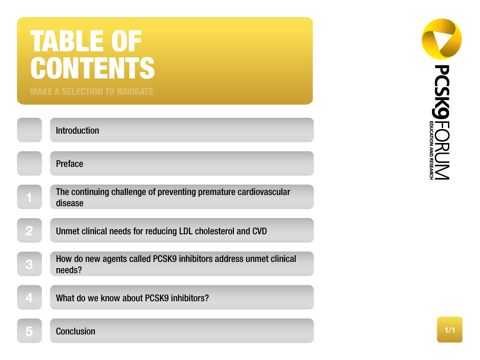
Low density lipoprotein cholesterol (LDL-C) is a major modifiable risk factor driving the development of atherosclerosis and cardiovascular disease (CVD). While statins are effective in lowering LDL-C, reaching target LDL-C is problematic for people at high CV risk. These include patients with inherited high cholesterol (familial hypercholesterolaemia, FH), established CVD and those unable to tolerate statin therapy, mainly due to muscle symptoms. New LDL-C lowering medicines are addressing the unmet clinical needs of these patients.
The discovery of PCSK9 (proprotein convertase subtilisin/kexin type 9), a protein which plays a pivotal role in controlling circulating LDL-C levels, has been the driver for the development of a new class of LDL-C lowering agents. PCSK9 binds to LDL receptors on cells, preventing them from being recycled to bind more LDL-C and leading to raised LDL-C levels in the plasma.
PCSK9 inhibitors are now approved in North America, Europe and other countries. They lead to increased availability of LDL-C receptors and, as a result, have been shown to lower LDL-C levels by more than 50% when added to statin and other lipid-lowering treatment. Responses are consistent across the spectrum of patients at high CV risk. PCSK9 inhibitors also lower lipoprotein(a), another established CV risk factor. PCSK9 inhibitors offer a new approach to achieving target LDL-C in patients at high CV risk.
With the advent of this novel approach, there is a need for an accessible resource which summarises what clinicians need to know about PCSK9. PCSK9 Forum is the independent online resource on PCSK9 science and clinical application, established by leading researchers in the fields of atherosclerosis, lipids and CVD. This App, authored by PCSK9 Forum Editors Professors Chapman and Ginsberg, provides a unique reference for clinicians. The App discusses the biology of PCSK9, and how PCSK9 inhibitors are likely to revolutionise the management of patients at high CV risk, in particular those with FH. The App also provides an overview of clinical evidence, covering both efficacy and safety, as well as case histories which have Continuing Professional Development Accreditation. This easy to read, comprehensive resource will help clinicians in their everyday practice to address the unmet clinical needs of patients at high CVD risk.



